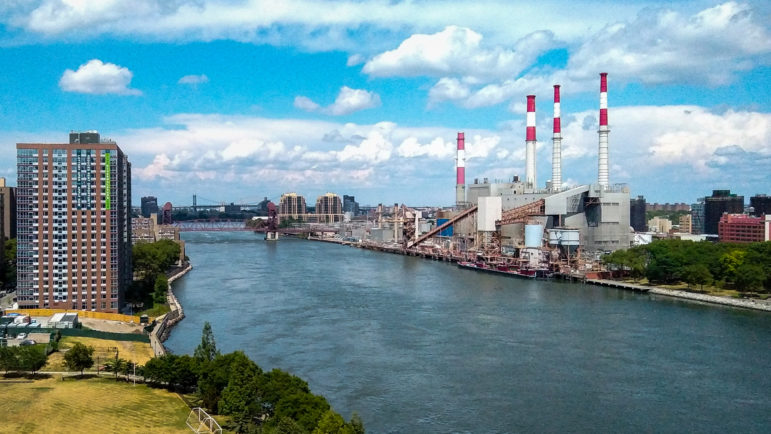The state amendment would require lawmakers to consider the environment in making legislative decisions, and New Yorkers would be able to sue if they believe their rights to a healthy environment are being violated.

Adi Talwar
High voltage transmission lines will run 333 miles underground or underwater from the Canadian border, south through Lake Champlain, along and under the Hudson River, and eventually terminate at a converter station at the northern end of Astoria, Queens.Update as of 11/3/21: New Yorkers on Tuesday voted overwhelmingly to approve Proposal Number 2, with more than 82 percent of New York City ballots voting yes on the amendment, with 97 percent of poll site scanners reported, according to preliminary results from the New York City Board of Elections. Statewide, nearly 61 percent of New Yorkers voted in favor of the amendment, while 27 percent voted against it and another 11 percent left the question blank.
The focus at the polls Tuesday may have been on selecting New York City’s next mayor, but a ballot proposal could have even longer-lasting implications.
On the ballot—one of five included in this election—New Yorkers were asked to consider amending Article 1 of the state constitution’s bill of rights to include the right to clean water, clean air and a healthful environment.
The proposal stipulates that if passed, lawmakers would have to consider the environment in making legislative decisions, and New Yorkers would be able to sue if they believe their rights to a healthy environment are being violated, according to the city’s Board of Elections.
Other states, including Pennsylvania and Massachusetts, have already adopted such amendments, but globally, the United States is lagging. More than 100 member states of the United Nations, which is currently holding its Climate Change Summit in Glasgow, Scotland, legally recognize the right to a clean and healthy environment in their constitutions. In October the United Nations Human Rights Council voted to recognize it as a fundamental right.
Voters interviewed by City Limits were mostly in favor of the proposal.
Monica Gaffney, originally from Ireland, said it was what motivated her to vote on Tuesday—she’s concerned about the future of the planet for her two children. “I just feel like for this generation, we’re leaving the earth, its infrastructure and political systems in a terrible state,” she said.
She’s been disappointed with the Biden administration’s response to the pandemic and believes lawmakers and corporations need incentive to implement policy. “I’m not that hopeful that the powers that be will stick to the rules,” she said.
Kirk Lester, exiting a poll site on the Upper East Side, also said he believes stricter enforcement is necessary. “It’s a good idea to save the planet any way we can,” he said.
Others were skeptical about how the amendment would be enforced.
Marc Perrin voted no—not because he disagreed with the sentiment, he said, but because he believes there are already federal regulations in place to protect the environment.
“I agree with the premise, but this would throw a wrench in complying with those laws,” he said.
Several voters said they didn’t know about the proposal until shortly before Election Day.
Bob Conley said he learned about it only Monday night. He voted “yes” but wasn’t impressed with the language used on the ballot (the exact wording: “The proposed amendment to Article 1 of the New York Constitution would establish the right of each person to clean air and water and a healthful environment. Shall the proposed amendment be approved?”).
“I found it remarkably vague,” Conley said. He questioned how it would differ from regulations set by the Environmental Protection Agency.
“Where are the teeth?” he asked. “I don’t know what I voted for.”
But the broad wording might be beneficial in that the amendment may act as a buffer from allowing future legislative actions from being diluted, explains Eddie Bautista, executive director of the NYC Environmental Justice Alliance.
“Having a constitutional right empowers the average New Yorker in a way that even outright laws and regulations sometimes miss their mark,” he said. “Such a right adds a new arrow to the advocacy quiver. Looking forward to seeing if we shoot straight or not.”
Liz Donovan is a Report for America corps member.










One thought on “On the NY Ballot: Is a Healthy Environment a Constitutional Right?”
I’ll laugh at the ‘greens’ when this amendment is used to fight every upzoning in the city and state. Upzoning leads to overcrowding which is not a ‘healthful environment’.